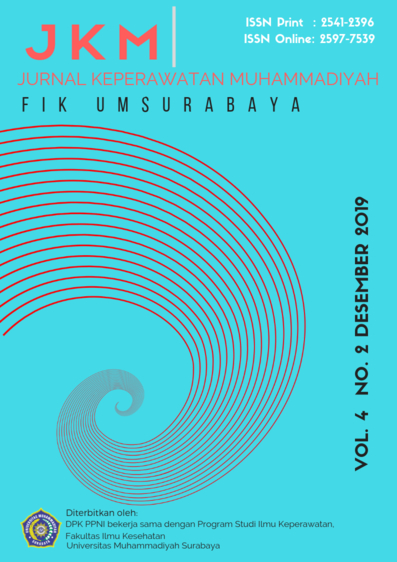Analisis Penerapan Terapi Murottal Pada Ibu Post Seksio Sesaria Atas Indikasi Riwayat Penyakit Jantung (Supraventricular Tachycardia) : Laporan Kasus
DOI:
https://doi.org/10.30651/jkm.v4i2.2869Keywords:
ibu post seksio sesaria, Superventricular Tachycardia, Terapi MurottalAbstract
In the world according to WHO 2014 there are (16%) SEKSIO SESARIA deliveries that exceed the recommended limits. Whereas in Indonesia according to the 2013 Riskesdas the method of cesarean section surgery was 9.8% of the total 49,603 births throughout 2010-2013. Based on the 2013 Riskesdas data in West Sumatra the rate of West Sumatra cesarean section delivery (14%) where the figure is almost close to the maximum WHO standard. One common complaint felt by post seksio sesaria mothers is surgical pain. The purpose of this study was to determine the analysis of the application of murottal therapy in post-secsio caesarea women on the indication of a history of heart disease to reduce postoperative pain in the obstetric room of RSUP Dr. M. Djamil Padang. Nursing implementation in accordance with the objectives and interventions that have been formulated. The implementation is carried out for 5 days, from 3-7 June 2018. Ny. A listens to the explanation, and demonstrates the explanation given, especially murottal Al-Qur'an therapy to reduce postoperative pain. From the results of observations and interviews that the author did, Ny.A understood what had been explained and demonstrated. It is hoped that this research will be useful for health workers to be able to apply murottal therapy as one of the complementary therapies in treating post-cesarean patients.
References
Bryanton, J., Gagnon, A., Johnston, C. & Hatem, M. 2008. Predictors of Women’s Perceptions of the Childbirth Experience. Journal Obstetric Gynecologic & Neonatal Nursing. No. 37. Hal 24-34. Available at: http://www. ncbi. nlm. gov/pubmed/ 18226154. [Accessed August 25, 2014]
Hidayat, D. (2010). Asuhan Keperawatan Maternitas. Jakarta: Salemba Medika
Mochtar, R. (2011). Sinopsis Obstetri Jilid 1. Jakarta. EGC.
Mulyawati,dkk, (2014) Data Pasien Post Operasi Sectio Caesaria. Kota Padang
Price, Sylvia A dan Lorraine M. Wilson. (2006). Patofisiologi, konsep klinis proses-proses penyakit. Jakarta: Penerbit EGC.
Reeder, Martin dan Koniak-Griffin. 2011. Volume 2 Keperawatan Maternitas Kesehatan Wanita, Bayi dan Keluarga Edisi 18. Jakarta : ECG.
Riset Kesehatan Dasar (Riskesdas). (2013). Badan Penelitian dan Pengembangan Kesehatan Kementrian RI tahun 2013. Diakses: 19 Oktober 2014, dari http://www.depkes.go.id/resources/download/general/Hasil%20Riskesdas%202013.pdf.
Sarwono, (2010). Ilmu Kebidanan, Jakarta: Yayasan Bina Pustaka.
Syarbini & Jamhari. 2012. Kedahsyatan Membaca Al-Quran. Bandung: Ruang Kata.
Winkjosastro H. Ilmu Kebidanan. Edisi ke-4 Cetakan ke-2. Jakarta: Yayasan Bina Pustaka Sarwoni Prawirohardjo: 2009, hal 523-529.
World Healt Organization. 2014. Diakes melalui (http://www.who.int/gho/maternity/epidemic_status/deatd/ctv/). Diakes pada tanggal 12 Oktober 2015.
Downloads
Published
Issue
Section
License
- Penulis tetap memegang hak atas karyanya dan memberikan hak publikasi pertama kepada jurnal ini yang secara simultan karya tersebut dilisensikan di bawah:Â Creative Commons Attribution-ShareAlike 4.0 International (CC BY-SA 4.0)













